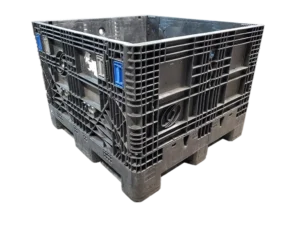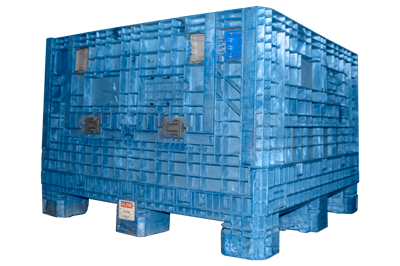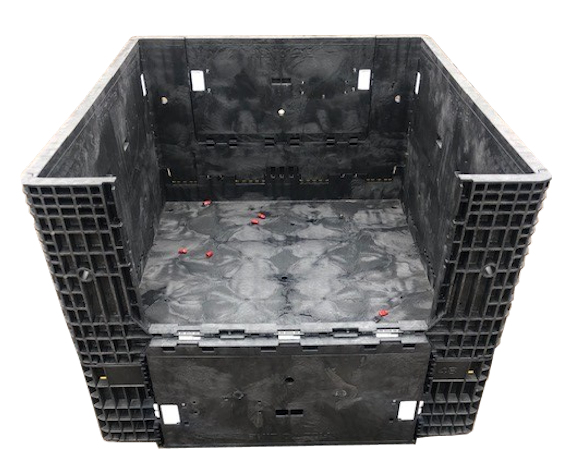Why Bulk Containers Are Crucial for Sustainable and Economical Transportation
Bulk containers play a crucial role in modern logistics. They help with the effective motion of huge quantities of goods, thus maximizing transport procedures. This technique not only decreases prices but also decreases environmental influence via reduced exhausts and waste generation. As sectors look for more sustainable practices, the adoption of bulk containers is becoming increasingly substantial. What ramifications does this shift hold for future logistics and supply chain monitoring?

The Benefits of Making Use Of Mass Containers in Logistics
Mass containers revolutionize logistics by improving efficiency and sustainability. These containers permit the transport of large amounts of items in a solitary journey, markedly decreasing the number of journeys required. This not just improves procedures yet likewise decreases labor expenses connected with handling, filling, and unloading. On top of that, bulk containers are made to enhance area application within transport automobiles, making certain that even more products can be shipped concurrently.
The standardization of mass containers additionally simplifies the logistics procedure. With consistent dimensions, they can be quickly stacked and stored, causing boosted storage facility administration. Furthermore, bulk containers usually feature long lasting products that secure contents from damage throughout transit, therefore decreasing product loss and raising overall reliability. Consequently, services can experience boosted supply chain efficiency, ultimately resulting in enhanced success and consumer satisfaction. This combination of elements makes mass containers an important asset in contemporary logistics.
Ecological Influence: Reducing Waste and Carbon Footprint
As markets increasingly focus on sustainability, the adoption of mass containers has actually become an essential technique for decreasing waste and reducing carbon impacts. These containers decrease making use of product packaging products, such as boxes and plastic, thereby especially lowering overall waste generation. By consolidating deliveries, bulk containers enhance transportation effectiveness, permitting for even more items to be transported per trip. This decrease in trips directly correlates with reduced greenhouse gas exhausts, contributing to a smaller sized carbon footprint.
Bulk containers can frequently be reused or reused, even more alleviating environmental influence. The durability of these containers guarantees they can stand up to multiple transportation cycles, decreasing the requirement for single-use alternatives. refurbished bulk containers. By improving logistics and promoting effective resource usage, bulk containers not only sustain lasting techniques yet also urge markets to straighten with global environmental goals. Inevitably, their implementation reflects a dedication to eco-friendly stewardship and accountable resource monitoring
Expense Cost Savings: Exactly How Bulk Containers Lower Transportation Costs
While numerous firms seek means to enhance their bottom line, the usage of mass containers presents a significant chance for lowering transportation costs. Mass containers optimize the quantity of goods carried, enabling organizations to deliver larger quantities at when. This effectiveness decreases the number of trips called for, straight decreasing fuel prices and lessening labor costs connected with loading and unloading.
Additionally, mass containers commonly include structured layouts that enhance space application within transport vehicles. This means less voids, resulting in more reliable use offered capacity. The sturdiness of mass containers can decrease the danger of product damage during transit, lowering losses and guaranteeing that even more goods get here undamaged.
Enhancing Supply Chain Effectiveness With Bulk Storage Space Solutions
Bulk storage solutions play a crucial duty in improving supply chain performance by maximizing inventory management. By combining goods into fewer, bigger containers, businesses can significantly reduce handling costs related to frequent transfers and handling. This streamlined approach permits for far better monitoring and management of supply, inevitably resulting in improved functional efficiency.
Streamlined Stock Administration
Effective supply management is vital for optimizing supply chain procedures, especially when companies embrace bulk storage space services. These options allow companies to preserve greater stock degrees while decreasing the regularity of replenishment. By combining products into mass containers, business can streamline their inventory processes, decreasing the complexity connected with tracking multiple smaller sized bundles. This method facilitates exact stock counts and boosts projecting accuracy, enabling even more informed decision-making. Furthermore, bulk storage remedies simplify storage facility organization, making it easier to locate and access items when required. Because of this, organizations can achieve a much more effective supply turn over rate, inevitably improving overall supply chain efficiency and decreasing the likelihood of stockouts or overstock scenarios.

Minimized Handling Costs
The execution of bulk next storage space remedies not only simplifies inventory administration but likewise substantially decreases taking care of expenses throughout the supply chain. By consolidating materials right into bulk containers, companies lessen the demand for frequent handling and transfer between various storage and transport units. This method minimizes labor costs related to loading, unloading, and relocating smaller bundles. Furthermore, mass storage decreases the frequency of shipments, leading to lower transportation prices and decreased fuel consumption. As an outcome, organizations can maximize their logistics procedures, permitting a more effective allowance of resources. Ultimately, lowered handling costs contribute to enhanced overall supply chain effectiveness, promoting an atmosphere that sustains both sustainability and economic practicality.

Flexibility of Mass Containers Across Different Industries
Several industries have unique needs for transport and storage space, bulk containers have emerged as a flexible option that fulfills a wide variety of requirements. These containers, varying from huge containers to specialized containers, can accommodate diverse materials, including liquids, granules, and powders. In the agricultural industry, bulk containers assist in the transport of plant foods and grains, while the food and beverage market utilizes them for components and completed items. The chemical market counts on bulk containers for securely transferring dangerous materials, guaranteeing compliance with security policies. Furthermore, construction companies profit from bulk containers for carrying aggregates and other materials. Their adaptability includes various modes of transport, including ships, trains, and vehicles, improving logistical performance. This convenience not just improves operations throughout various markets yet also promotes sustainability by decreasing packaging waste and enhancing space in transportation. Mass containers play a crucial duty in modern supply chain monitoring.
Future Patterns in Bulk Container Use and Sustainability
The future of bulk container usage is significantly formed by innovative products development that enhances sustainability. In addition, automation in logistics assures to improve procedures, lowering waste and improving performance. Accepting round economic situation methods will certainly additionally revolutionize just how bulk containers are created, utilized, and recycled, fostering a much more lasting transport landscape.
Innovative Products Development
As markets increasingly focus on sustainability, cutting-edge materials advancement wholesale containers emerges as a substantial consider boosting eco-friendly transportation remedies. Manufacturers and researchers are checking out eco-friendly plastics, recycled composites, and light-weight steels to reduce environmental effect. These products not just minimize waste however likewise boost gas efficiency by reducing the general weight of containers. In addition, developments in wise products, which can adjust to varying problems, boost the sturdiness and performance of mass containers. The assimilation of these innovative materials aligns with round economy concepts, advertising reuse and recycling. As the need for lasting practices grows, the advancement of such materials will play a crucial duty in shaping the future of bulk container usage in logistics and transportation.
Automation in Logistics
Considerable improvements in automation are positioned to change logistics and the use of mass containers, improving sustainability in transportation. Automated systems, consisting of drones and independent lorries, are simplifying the activity of mass containers, lowering the dependence on standard fuel-powered transportation. These innovations optimize transmitting and loading procedures, improving and lessening vacant miles gas performance. Furthermore, automated supply administration systems enhance tracking and tracking of bulk containers, ensuring far better resource allotment and minimized waste. The combination of the Net of Points (IoT) enables real-time data evaluation, allowing proactive decision-making that straightens with sustainability goals. As automation proceeds to evolve, it is anticipated to drive additionally advancements in bulk container use, eventually supporting even more sustainable logistics methods and reducing the ecological impact of transport.
Circular Economy Practices
Innovations in automation are setting the phase for a much more integrated approach to round economy methods in the domain name of bulk container use. As industries significantly accept sustainability, mass containers are being created for long life and reusability. This change not just minimizes waste but likewise enhances source efficiency. Business are embracing approaches such as closed-loop systems, where utilized containers are collected, refurbished, and reestablished into the supply chain. Furthermore, clever innovations track container life process, helping with far better monitoring and reducing ecological influence. The collaboration between makers, logistics suppliers, and end-users is essential in establishing requirements for this link lasting container use. refurbished bulk containers. Future fads indicate an expanding focus on products that are recyclable and biodegradable, further strengthening the round economy's principles wholesale transportation

Frequently Asked Concerns
What Materials Are Mass Containers Generally Made From?
Mass containers are usually constructed from long lasting materials such as high-density polyethylene, cardboard, light weight aluminum, and steel. These products supply versatility, stamina, and security, making them appropriate for moving different items in different industries successfully.
How Do I Choose the Right Size Mass Container?
Selecting the appropriate size mass container includes evaluating the quantity of products to be carried, considering handling tools compatibility, and evaluating storage room needs. Proper dimension warranties performance in transport and reduces waste throughout delivery.
Are Mass Containers Reusable or Recyclable?
Mass containers are frequently recyclable, created for several journeys, improving sustainability. Lots of can likewise be recycled, depending upon the materials used. Selecting recyclable options further sustains environmental goals and lowers waste in transport methods.
What Safety Regulations Relate To Mass Container Transportation?
Security policies for bulk container transport include conformity with the Division of Transportation guidelines, correct labeling of harmful materials, structural honesty analyses, pop over to this site and adherence to weight limits to ensure risk-free handling and stop accidents during transit.
Just How Can Organizations Shift to Using Mass Containers Efficiently?
Organizations can alter to bulk containers by evaluating present logistics, educating team on handling, buying suitable tools, enhancing inventory monitoring, and working together with suppliers to assure compatibility and performance throughout the supply chain.
As industries significantly prioritize sustainability, the fostering of bulk containers has arised as an essential method for reducing waste and reducing carbon impacts. By consolidating materials right into mass containers, companies can simplify their inventory procedures, reducing the intricacy associated with tracking several smaller sized plans. As industries progressively prioritize sustainability, cutting-edge products development in bulk containers emerges as a substantial factor in enhancing environment-friendly transportation services. Automated systems, consisting of drones and autonomous vehicles, are improving the motion of mass containers, reducing the reliance on traditional fuel-powered transport. Furthermore, automated stock monitoring systems boost monitoring and tracking of bulk containers, making certain better source appropriation and reduced waste.